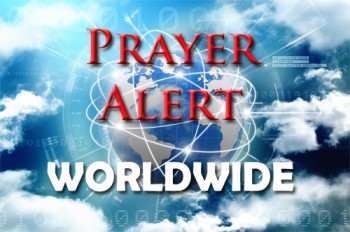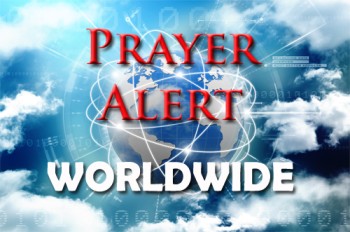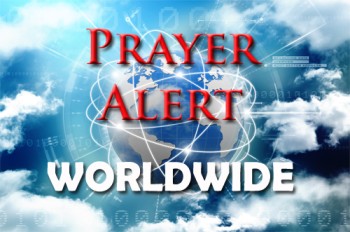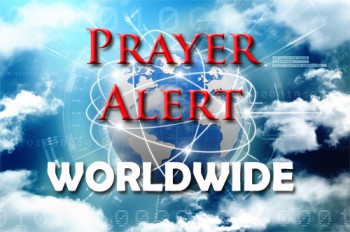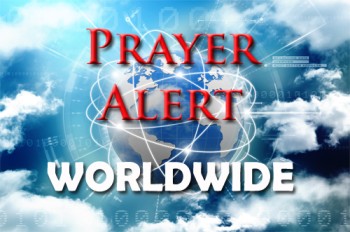Displaying items by tag: Asia
Tabitha: ‘ Jesus is mighty to save’
Video footage of Tabitha Nazir Gill, a Christian nurse, being beaten up by colleagues went viral in 2021 after she was accused of breaking Pakistan’s penal code by insulting Mohammed, a crime which carries the death sentence. She went into hiding as police investigations continued. Later she said, ‘The mob wanted to kill me but I kept praying to Jesus and I opened my eyes and felt I saw angels. From that moment I knew that I would be saved. I am thankful to Jesus Christ, my Lord and my God, for giving me my freedom. Jesus is mighty to save.’ She thanked God for those who had secured her safe passage out of Pakistan, including ‘the miracle’ of being granted an immigrant visa to a new country in the West, which cannot be disclosed for safety reasons.
Israel: war with Hezbollah?
The Hezbollah terror group has recently raised the frequency of provocations on Israel's northern border. On 12 July angry rioters went to the security fence on Israel's northern border with Lebanon to light fires and hurl rocks. Israel’s soldiers (IDF) were forced to fire warning shots to disperse them. Also, recent missile fire near Ghajar only barely missed a military vehicle. A different result would have utterly changed the situation in northern Israel. Hezbollah has illegally erected several tents within the Mount Dov area and has coerced Lebanon’s government into asserting additional claims on Israel, demanding they remove a fence securing the village of Ghajar. ‘No one knows when it will happen, but war is just a matter of time. We are on high alert. There are provocations on the border fence’, said the IDF commander.
India: violence against Christians unchecked
On 3 May deadly riots broke out between the Muslim Meitei tribe and the Christian Kuki-Zo tribes in Manipur. Since then over 130 Kuki-Zo have been killed and over 50,000 displaced. Now that the internet ban has been lifted, a 26-second video has emerged after two months showing dozens of men parading and assaulting two naked Christian women. Elsewhere, a Christian woman’s husband was killed by a mob who then surrounded and sexually assaulted her daughter. Her son was killed trying to stop them. ‘How can the police say they aren’t aware of what happened when they were present while we were assaulted? The bodies of my husband and son were taken by them to the government morgue in Imphal’, she told Al-Jazeera. These are just two of the ongoing violent attacks on Christian women and brutal killings of Christian families, with homes being burned down and communities being terrorised.
Iraq: religious intolerance
On 20 July Iraq expelled the Swedish ambassador only hours after protesters angered by the burning of the Quran in Sweden stormed the Swedish embassy in central Baghdad, scaling the walls of the compound and setting it on fire. Iraq’s prime minister also recalled his country’s chargé d’affaires in Sweden and suspended the working permit of Swedish telecom company Ericsson on Iraqi soil. The burning of the embassy was called by supporters of the influential Iraqi Shia religious and political leader Muqtada al-Sadr, to protest against the second planned burning of a Quran in front of the Iraqi embassy in Stockholm that day. However, although protesters in Sweden kicked and partially damaged the Quran, they did not burn it as promised. In Baghdad, all the Swedish embassy staff are safe. Sweden’s foreign ministry condemned the attack and highlighted the need for Iraqi authorities to protect diplomatic missions. See also Europe article 2, ‘Sweden: religious intolerance’.
India: Delhi hit by massive monsoon floods
In Delhi, floods from the Yamuna river caused roads to turn into rivers and water gushed into houses, medical facilities, crematoriums and shelter homes. It is impairing normal life and causing immense hardship for the people in the national capital as the river water level rose to a record high. Amid the flooding, the city is staring at a shortage of drinking water after the government decided to cut down supply by 25 percent following the closure of three water treatment plants due to the rising level of the Yamuna. It swelled to a staggering 208.62 metres at 1 pm on 13 July, smashing the previous all-time record of 207.49 metres set 45 years ago. Rescue teams have been deployed, and administration and agencies are also working together. At the time of writing they have evacuated around 2,500 people from different areas.
Indonesia: Java
Java is not the largest island in Indonesia, but it has the largest population. Praise God that the Church on Java continues to grow. Nearly 50% of Chinese-descent Indonesians and 5% of Javanese are Christian. The many religions of Java historically tolerated each other. But this has changed. Persecution now comes in the form of laws that prevent Christians from building, which sometimes results in the destruction of churches and Christian property. Christians of many traditions now draw together for prayer, worship, and mutual support: and the love among them attracts many Muslims to Christ, despite the persecution. Christian love for the needy and most vulnerable people in society has a powerful effect. Pray for the unreached people groups, including the 34 million Sunda who profess Islam but have underlying animism and traditional beliefs. They are one of the largest unevangelised groups in the world.
Vietnam: imprisoned pastor denied medical treatment
A Protestant pastor and human rights defender has been denied medical treatment at Gia Trung prison despite his deteriorating health condition. Pastor Nguyen Trung Ton has long-term Covid-19 and an eye disease causing almost total vision loss. Prison authorities have not allowed him to be examined or treated, have prevented his family sending him medicine, and not allowed them to pay for medical care. Experts have previously voiced concerns regarding his treatment and conditions in prison, including lack of clean water and failure to treat a leg injury sustained from a state agent’s attack. Mr Ton's wife, Nguyen Thi Lanh, is worried for her husband’s life. He has advocated for freedom of religion or belief and spoken out against social injustices. He was jailed for twelve years in 2018 on charges of ‘carrying out activities to overthrow the government’.
Indonesia: challenges to Christians
Church building in Indonesia is subject to onerous requirements, including the requirement to get signatures from 60 neighbouring households - each of which must be non-Christian - before permission to construct a church building can be granted. Often Islamist groups engage in lobbying local authorities and communities to try to prevent churches from being built, despite the support for religious freedom voiced by the central government. Pray that Christians will be as wise as serpents and innocent as doves in navigating these difficulties (Matthew 10:16). President Widodo’s government successfully dissolved two hard-line Islamist organisations, Hizbut Tahrir Indonesia and Islamic Defenders Front. However, a new group has now emerged - the Islamic Reformist Movement, funded by Saudi Arabia. Hostility from Muslims towards Christians varies across Indonesia, a vast country comprising thousands of islands. Even if the central government supports Christians, provincial and local authorities may be hostile.
Israel: anger reignited
The roots of violence, despair and hatred between Palestinians and Israelis goes deep, generated by possession of the land. The latest Israeli attack on the West Bank targeted the ‘unified command centre for the Jenin Brigade’ which has been at the heart of twelve months of escalating violence (over fifty recent attacks have come from there). Bulldozers drove through the Palestinian refugee camp which was also attacked by aircraft, reviving a tactic it halted two decades ago. Eight Palestinians were killed and one Israeli. For over a year, army raids have been linked to a series of deadly attacks by Palestinians against Israelis and rampages by Jewish settlers against Palestinian villages. Israel said it was striking terrorist infrastructure targets and armed gunmen in the Jenin camp and shared documents showing Jenin as a ‘stronghold of terrorist activity’ where half the people belong to militant groups. However, the scale of the attack on Jenin has drawn strong criticism from many sourcres.
Syria: relief finally arrives
Ten UN relief trucks carrying aid finally reached northwest Syria four months after huge earthquakes rocked the region. This was the first aid convoy to cross from government territory into a rebel-held enclave since aid deliveries became a political pawn following the disaster. Pray for the 15 million Syrians needing help to survive, and for God to comfort an estimated 8.8 million people affected by the earthquakes; they may have a roof over their heads, but their hearts remain unsettled. Every new aftershock triggers a flashback and trauma. No one knows when the earth will stop moving. Pray for the global church as it continues to offer help and hope. Syrian Christians have been helping earthquake survivors from day one. Believers are telling people about God’s love, which their consistent presence shows is real.

